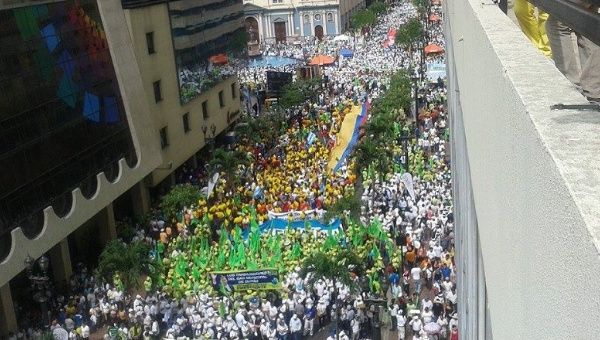By Delisa Morris
Impunity Watch Reporter, South America
On Saturday, President Rafeal Correa of Ecuador presented the labor code reforms package, which coincided wight eh 92nd anniversary of the workers massacre in Guayaquil. President Correa spoke to an audience of about 100,000 people.

In the coastal city of Guayaquil, before more than 100,000 workers, President Rafael Correa presented the final package of reforms to the labor code to the President of the National Assembly Gabriela Rivadeneira.
Carlos Marx Carrasco, minister of labor relations spoke about Ecuador’s labor reforms, following the massive show of support.
“Of course, these reforms represent a milestone int eh region and surely, unions, the governments, entrepreneurs from other countries will be watching us. And hopefully these dreams of our workers are made into reality throughout Latin America also,” said Marx.
The document seeks to expand workers rights, the reforms are universalizing the social security system, extending benefits to some 1.5 million homemakers. Furthermore, the reforms seek to give rester proaction to workers from historically marginalized groups as well as eliminate fixed-term contracts, among other gains for employees.
“Some have all their right guaranteed, and others, like the campesinos, informal workers, and homemakers did not have anything. This is why we are presenting these reforms to the labor code and to social security.” said President Correa on Saturday.
Several of the workers attending Saturday’s rally are members of a recently formed union, the United Workers Trade Union Federation (CUT).
The event purposely coincided with the 92nd anniversary of a massacre of about 1,500 workers in the city of Guayaquil who were involved in a general strike. The fall of cacao prices under the presidency of Dr. Jose Luis Tamayo following World War I obliterated the country’s export potential, greatly affecting the national economy as well as working conditions and salaries.
The strike led to a freeze of all economic and political activities in Guayaquil. On November 14, several trade union leaders were arrested. Several people demanded they be released as well as greater protection rights, reasonable work hours and adequate living salaries. These demands attracted other workers, an their demonstrations were violently repressed. Around 3,000 members of the military attacked crowds, killing both workers and civilians.
The massacre is commemorated each year with a ceremony, where workers and civilians leave crosses and flower crowns to drift in the river. The reforms package will not be debated within the National Assembly.
For more information, please see:
Cuenca High Life – Ecuador marks 90th anniversary of ‘Guayaquil Massacre’, as many as 1,500 labor demonstrators died in hail of bullets – 15 Nov. 2014
telesur – Massive Ecuador Rally Commemorates Workers, Advances Revolution – 15 Nov. 2014
el ciudadano – Workers’ massacre of 1922 was hidden by the media in Guayaquil – 11 Nov. 2014
telesur – Ecuador: As Reforms to Labor Code Pushed Forward, Past Remembered – 15 Nov. 2014